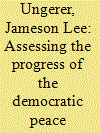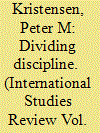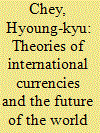|
|
|
Sort Order |
|
|
|
Items / Page
|
|
|
|
|
|
|
| Srl | Item |
| 1 |
ID:
111969


|
|
|
|
|
| Publication |
2012.
|
| Summary/Abstract |
This article analyzes the evolution of the democratic peace, beginning from the initial observation of a lack of wars and rarity of conflicts between democratic regimes to a number of competing and/or compatible explanations over the causality of the observed peace. A Lakatosian methodology is applied as a foundation for assessing the progress of the research program, according to the four traditionally recognized concepts: a hard core; a positive heuristic; a negative heuristic; and the auxiliary hypotheses. Theories are distinguished based on their theoretical and empirical progressiveness, as well as progressive intra-program problem-shifts. Explanations over the active causal process have often been seen as competitors, yet a Lakatosian framework enables seemingly inconsistent hypotheses to be grafted onto an existing research program, which can be determined to be progressive if they provide increased explanatory power and novel predictions that receive empirical corroboration. By these criteria, the research on capitalist development and the ongoing democratic peace research are not incompatible, provided that further additions to the research program ascertain the progressive criteria. Furthermore, by highlighting the areas that can best explain and predict the democratic peace phenomenon, the Lakatosian analysis offers insights for future progression in the field, as well as the areas upon which research should be focused.
|
|
|
|
|
|
|
|
|
|
|
|
|
|
|
|
| 2 |
ID:
111973


|
|
|
|
|
| Publication |
2012.
|
| Summary/Abstract |
This article argues that neo-Gramscian theorizations of "hegemony" have failed to illuminate the role of nineteenth-century Britain in the rise of a liberal world economy in three respects. First, they have provided mutually exclusive accounts of the social forces underpinning domestic and international hegemony. Second, they have failed to show Britain's agency in the making of a liberal world order. Third, they have posited a uniformity of social forces and liberal state forms that elides the differences between British and continental societies, thereby obscuring the real reasons for the general shift to liberal internationalism. We argue that it was the structural differences in the economic, social, and political organization of Britain and continental Europe that made free trade without a hegemon possible. Neo-Gramscian theorists of hegemony-just like their mainstream peers-have unduly generalized from the unique structures of American hegemony after 1945. Instead of serving as a master concept to organize the history of international relations, hegemony itself needs to be historicized: as a singular and temporally limited possibility of societal and international rule, preceded and succeeded by other forms.
|
|
|
|
|
|
|
|
|
|
|
|
|
|
|
|
| 3 |
ID:
111970


|
|
|
|
|
| Publication |
2012.
|
| Summary/Abstract |
International Relations (IR) has cultivated an image as a discipline with strong divisions along paradigmatic, methodological, metatheoretical, geographical, and other lines. This article questions that image analyzing the latent structures of communication in IR. It uses citation data from more than 20,000 articles published in 59 IR journals to construct a network among IR journals and finds a discipline with a center consisting of pedigreed IR journals, albeit closely related to political science. Divisions are identifiable as specialty areas that form clusters of specialized journals along the periphery of the network-security studies and international political economy in particular-but communication is also divided along the lines of geography and policy/theory. The article concludes that divisions notwithstanding, IR communication remains centered around American, general, and theoretical IR journals and that to practice this particular kind of communication is an important dimension of being an IR scholar.
|
|
|
|
|
|
|
|
|
|
|
|
|
|
|
|
| 4 |
ID:
111971


|
|
|
|
|
| Publication |
2012.
|
| Summary/Abstract |
The international standings of currencies form a principal characteristic of the international monetary order, shaping the world economic and political system by influencing the economic and political relationships among countries. This paper provides a systematic review of the literature on international currencies, encompassing both economics and political science, with the aim of providing useful groundwork to help develop a better analytical framework for the study of international currency standing. In particular, this paper discusses the international currency concept, the benefits and costs of issuing an international currency, and the determinants of international currency standing. It also assesses conflicting prospects for the future of the US dollar as the world's key currency, addressing the likelihoods of further internationalization of the euro and the renminbi, the dollar's main potential rivals. It in addition calls attention to certain political economy factors as salient issues for the future study of international currency standing.
|
|
|
|
|
|
|
|
|
|
|
|
|
|
|
|
| 5 |
ID:
111972


|
|
|
|
|
| Publication |
2012.
|
| Summary/Abstract |
Since the early 1990s, the large-N civil war research program has been a vibrant one but has reached an analytical plateau because methodological issues have obscured fundamental conceptual and theoretical concerns. The existing ground-clearing work has shed light on macro- and micro-level determinants of internal conflict onset, duration, and termination, but has left the field theoretically impoverished. This article discusses remaining gaps in the quantitative civil war literature, and proposes conceptual, theoretical, and methodological remedies. Five main lacunae are identified. First, civil war may be a longer process, with several waves of escalation and de-escalation, than generally described in the extant literature. Second, existing theories conflate civil conflict with violence-war onset and violence may be conceptually distinct. Third, we have few systemic-level theories of civil war onset and duration. Fourth, we need better theories that allow us to determine whether civil wars are different from other types of wars. Finally, we need to go beyond state-centric monadic approaches, and be more rigorous when building our models for explaining civil war onset, duration, or termination.
|
|
|
|
|
|
|
|
|
|
|
|
|
|
|
|
|
|
|
|
|